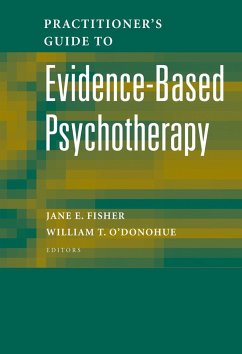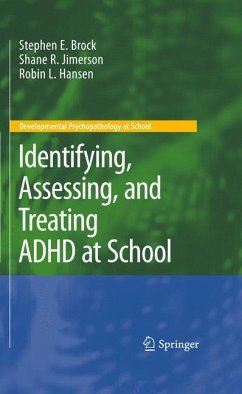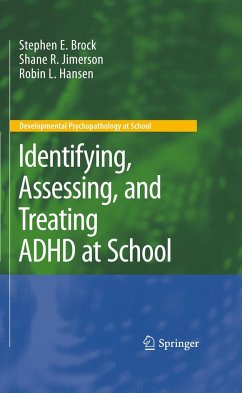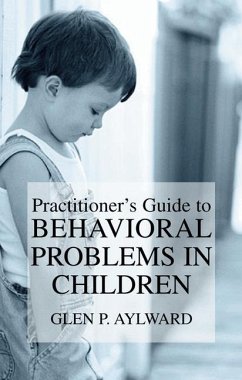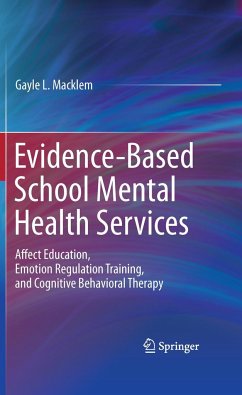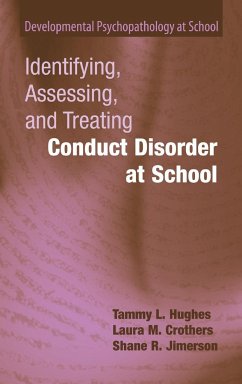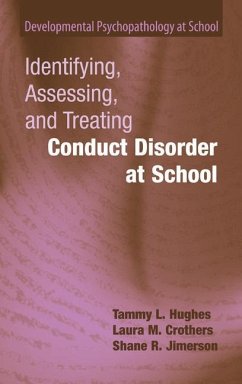
Practitioner's Guide to Emotion Regulation in School-Aged Children
Versandkostenfrei!
Versandfertig in 1-2 Wochen
38,99 €
inkl. MwSt.
Weitere Ausgaben:

PAYBACK Punkte
19 °P sammeln!
Most children master emotion regulation skills during their early childhood, though, increasingly, many enter school with mild or serious deficits that may not be addressed effectively or early enough. Practitioner's Guide to Emotion Regulation in School-Aged Children presents in-depth background and practical information on the subject to enable school professionals to craft interventions that are developmentally appropriate, relevant, and timely.In this volume, variables that contribute to emotional regulation are identified, complex relationships between emotions, stress, and temperament ar...
Most children master emotion regulation skills during their early childhood, though, increasingly, many enter school with mild or serious deficits that may not be addressed effectively or early enough. Practitioner's Guide to Emotion Regulation in School-Aged Children presents in-depth background and practical information on the subject to enable school professionals to craft interventions that are developmentally appropriate, relevant, and timely.
In this volume, variables that contribute to emotional regulation are identified, complex relationships between emotions, stress, and temperament are explored, and challenges to competence at school (e.g., test anxiety, bullying) and at home (e.g., punishment for "wrong" emotions) are examined. Strategies for recognizing specific skill deficiencies or more general needs are provided, along with emotion coaching techniques, cognitive-behavioral methods, anger management programs, empathy training, and other interventions. Dozens of worksheets and handouts included in the book can be reproduced or fine-tuned to fit age and ability levels.
Featured topics include:
Emotion dysregulation as a risk factor for mental disorders, including anxiety, depressive disorders, and the autism spectrum. The biology of emotion regulation, and its potential in designing interventions. Strengthening parenting skills to reinforce children's emotional skills. Working with teachers to improve the emotional climate in the classroom. The peer group: translating self-regulation into social contexts. Step by step intervention processes.
With targeted training at the classroom, home, and peer levels, children can better attain the vital skills they need for a lifetime of social interactions. This volume is an essential resource for school psychologists and other school-based mental health professionals.
In this volume, variables that contribute to emotional regulation are identified, complex relationships between emotions, stress, and temperament are explored, and challenges to competence at school (e.g., test anxiety, bullying) and at home (e.g., punishment for "wrong" emotions) are examined. Strategies for recognizing specific skill deficiencies or more general needs are provided, along with emotion coaching techniques, cognitive-behavioral methods, anger management programs, empathy training, and other interventions. Dozens of worksheets and handouts included in the book can be reproduced or fine-tuned to fit age and ability levels.
Featured topics include:
Emotion dysregulation as a risk factor for mental disorders, including anxiety, depressive disorders, and the autism spectrum. The biology of emotion regulation, and its potential in designing interventions. Strengthening parenting skills to reinforce children's emotional skills. Working with teachers to improve the emotional climate in the classroom. The peer group: translating self-regulation into social contexts. Step by step intervention processes.
With targeted training at the classroom, home, and peer levels, children can better attain the vital skills they need for a lifetime of social interactions. This volume is an essential resource for school psychologists and other school-based mental health professionals.






